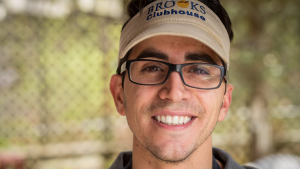Eric Sorensen’s Journey: Overcoming Traumatic Brain Injury to Inspire Brooks’ Newest Program
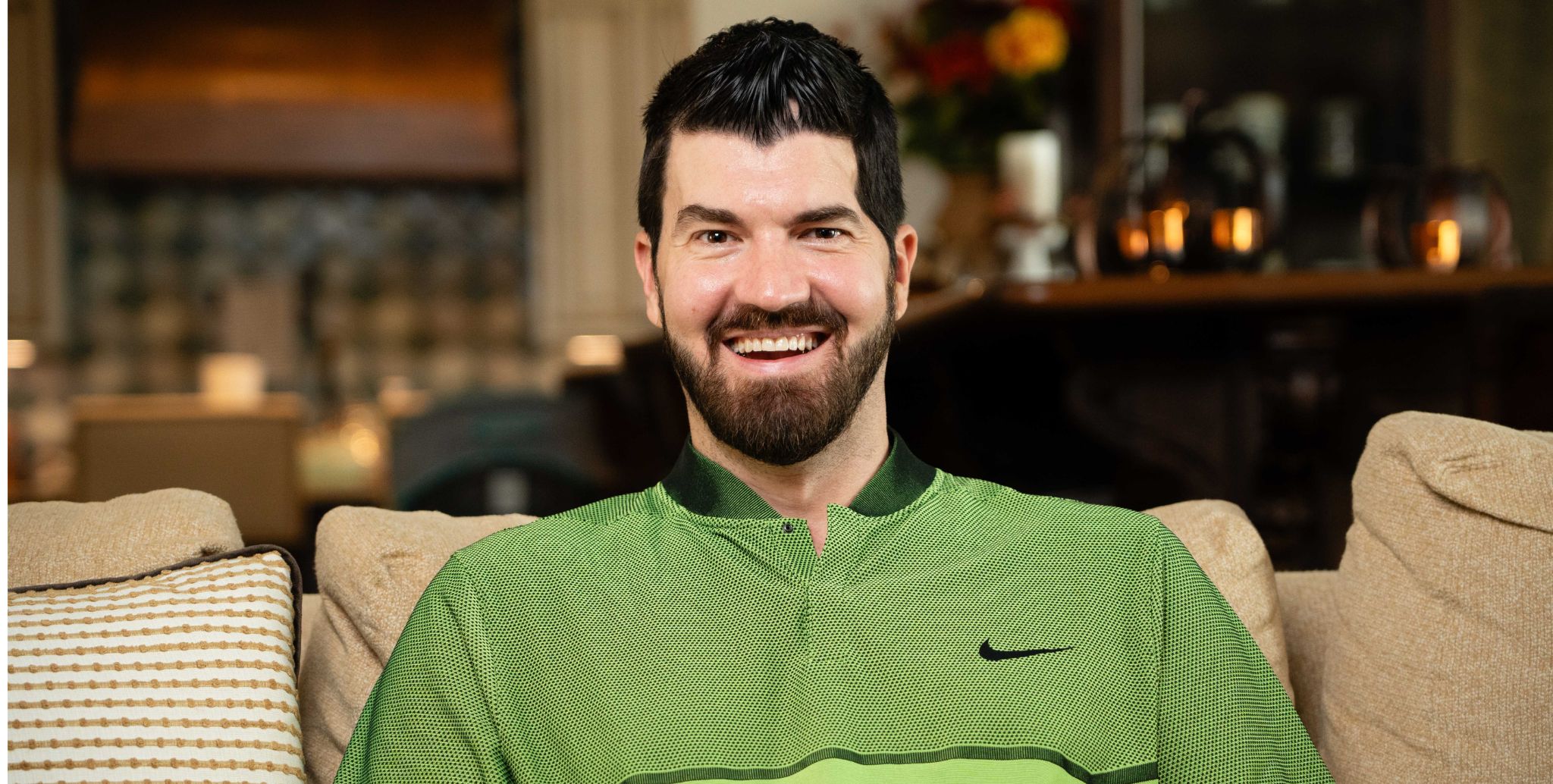
Back to physical health resource hub
Eric Sorensen is well acquainted with major medical events and with Brooks Rehabilitation. After supporting his mother’s recovery through a critical illness, Eric and his family thought they put hospitals behind them. Little did they know, just two years later, Eric would need Brooks’ services himself after a traumatic brain injury (TBI).
In January 2020, Eric was visiting his parents when he suddenly had a seizure and fell. He struck his head on the ground and suffered a major traumatic brain injury (TBI).
He was rushed to Baptist Medical Center where he required a hemicraniectomy. A hemicraniectomy is a surgical procedure where part of the skull is removed to reduce the intracranial pressure. His critical condition required intensive care by the Baptist neuro specialists.
Eric Begins His Rehabilitation Journey at Brooks
Five and a half weeks later, Eric was transferred to Brooks Rehabilitation Hospital – University Campus, where his mother, Puschel Sorensen, was previously a patient after being paralyzed by Guillian-Barre Syndrome. Under the care of Kenneth Ngo, MD, and the brain injury team, Eric began his rehabilitation journey.
In less than four months after his injury, during COVID-19 shutdowns, Eric began home health services with Brooks. He had severe swallow, voice and communication needs. Eric started working with speech-language pathologist, Jackie Hurst, MS, CCC-SLP. Within moments of seeing Eric, it was clear to her that he could understand. Yet at that time he had no means of functional communication.
Eric had significant physical needs when he returned home in a wheelchair and began working with Ryan Hughes, PT, DPT, a physical therapist with Brooks home health. He suffered from right-sided paresis, left hip pain and a right visual field neglect, which is a lack of attention to any stimuli on the right side of the body.
Once COVID-19 restrictions were lifted, Eric was able to participate in the Brooks Neuro Recovery Center’s (NRC) Cyberdyne Program with both Robert McIver, PT, DPT, and Abby Maillet, PT, DPT. To address his right upper extremity mobility, Eric started outpatient occupational therapy services with Amy Jo Rohe, MSOT, OTR/L, CSRS, CBIS.
The team had Eric walking in October of 2020. He then went into Mayo Clinic for a total left hip replacement. Following surgery, Eric got back to work with Hughes, McIver and Maillet. It wasn’t long before he was walking again.
Eric’s team thought he’d be able to transfer to another Brooks care setting for more specialized, intensive speech therapy services. However, Eric’s apraxia was severe.
Apraxia Diagnosis
Apraxia is a motor speech disorder caused by a neurological event. The brain is unable to plan and deliver correct movement instructions to the body.
One type of apraxia affects the brain’s ability to organize and sequence lip, jaw and tongue movements necessary for speech. Another type of apraxia inhibits the coordination and timing needed for swallow. Additional types of apraxia affect the motor planning needed for limb movements/gesturing, the ability to respond to verbal commands, the motor program needed for forming written words and the soft palate function needed for voicing.
Eric was suffering from all of the above.
Filling a Gap in Speech Therapy Services for TBI
Eric did not meet the criteria for Brooks’ Brain Injury Day Treatment Program, Brain Injury Clubhouse or Aphasia Center (BRAC). He needed intensive apraxia treatment that neither outpatient nor home health therapists were able to provide.
Eric’s injury identified a gap in Brooks’ speech therapy services that needed to be fixed immediately.
However, he continued to make progress. Within 5-6 months of his initial injury, Eric began voicing to the sound of familiar music consistently in speech therapy sessions.
With the help of Jodi Morgan, MS, CCC-SLP, manager of the BRAC, Eric and Jackie were connected with an apraxia expert Lauren Bislick, Ph.D., CCC-SLP, CBIS, at University of Central Florida in Orlando, Fla.
Dr. Bislick evaluated Eric, confirmed his apraxia diagnoses, and agreed that he would need intensive speech treatment.
Moving to Orlando was not an option, so Dr. Bislick provided a plan of care that she would oversee and Hurst would carry out. Jackie began implementing phonomotor treatment and Eric’s speech therapy sessions were increased to 8 hours/week. His progress has been tremendous. He has improved with oral control/awareness, speech production, voice/resonance, reading comprehension and written expression.
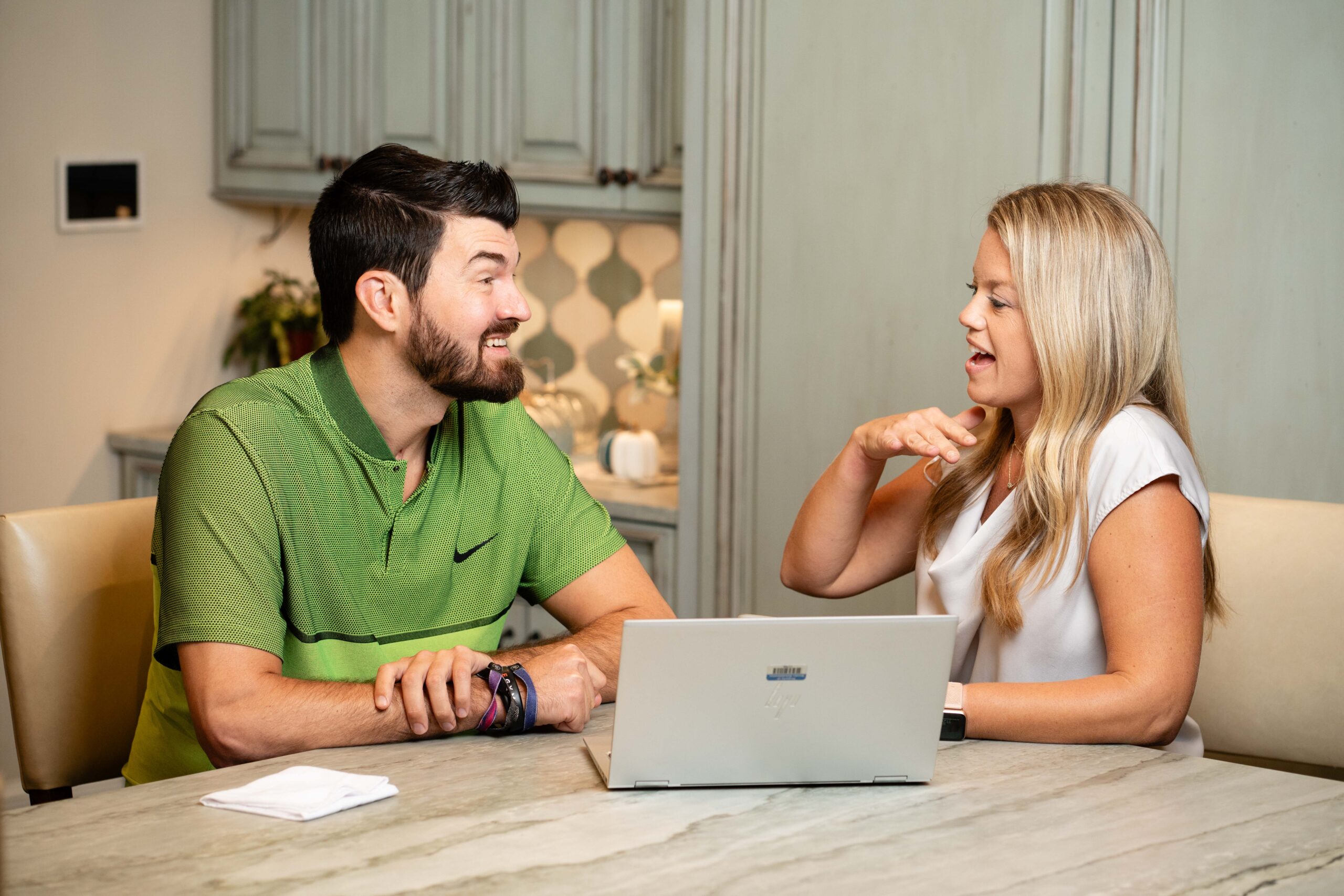
Overcoming Recovery Setbacks
As Eric continued to prove his awareness and ability to understand, he was still unable to express basic wants and needs due to his severe apraxia.
Eric had progressed to high-level physical movements, like jogging. He then suffered another seizure and fell. The fall resulted in the need for a total right hip replacement in November 2022.
While his second hip replacement was an unexpected setback, it did not stop Eric from moving forward. Within days of his second hip surgery, he was back to walking without a device.
Eric’s Current Level of Recovery
Today, Eric continues to make progress with both his communication and physical abilities. He communicates in a variety of ways, using gestures appropriately; writing or typing his wants and needs; and has words he is able to say aloud. He keeps up with friends and family via text and social media.
He is also plays golf and guitar, and is walking on the beach without any assistance.
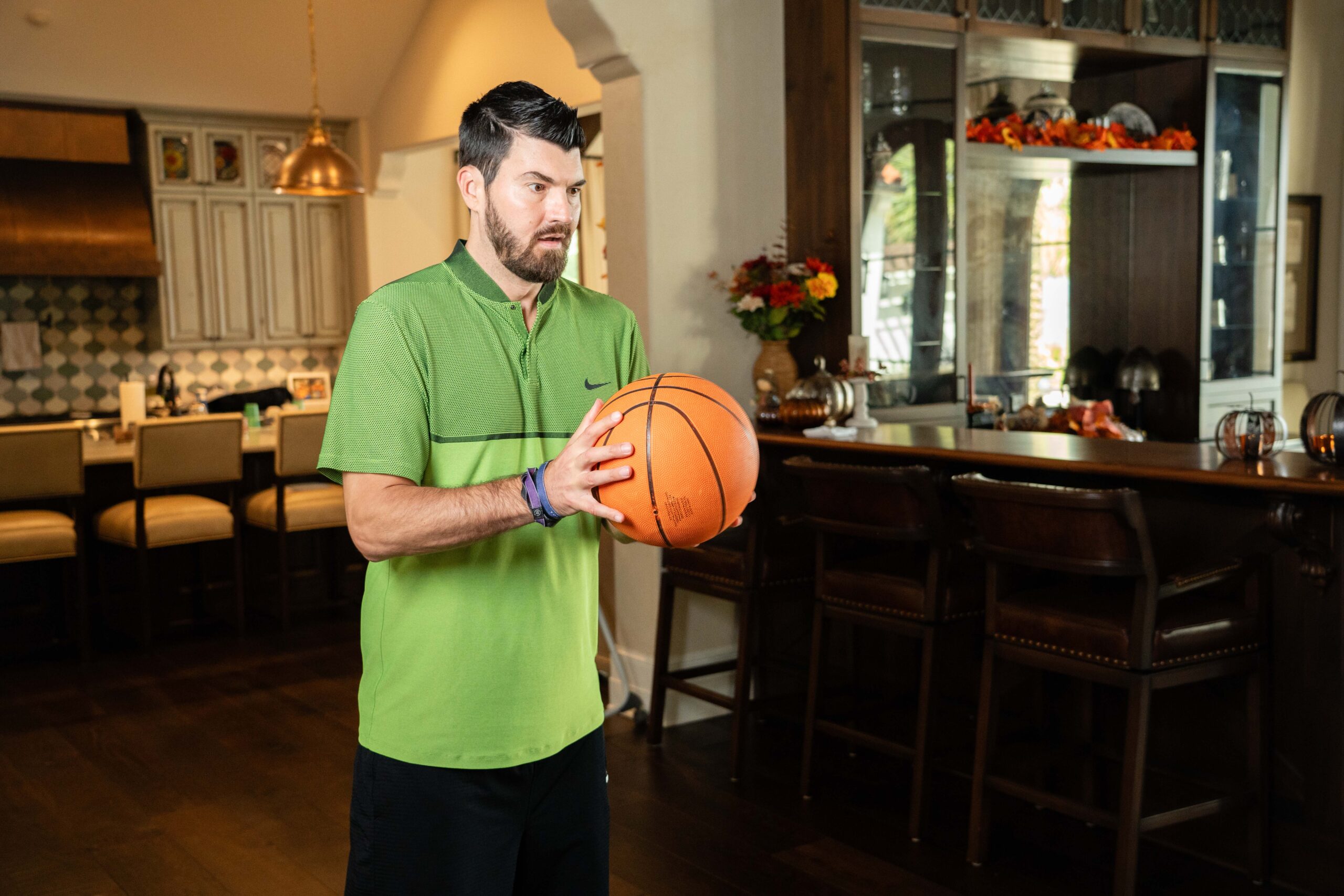
Ongoing Therapy for Continued TBI Recovery
Eric continues to make great progress with his fine motor abilities and works weekly with Leanne Williamson, OTR/L at Brooks’ Mandarin outpatient clinic. He is also making advances in his use of augmentative alternative communication and speech-language output in weekly sessions, Eric Perez, MA, CCC-SLP.
Eric has advanced to high-level upper/lower body coordination tasks and complex balance exercises during his weekly physical therapy sessions with Ryan Hughes. He also attends the Williams Family YMCA Adaptive Community Wellness program almost daily. He works under the guidance of Reggie Fowlkes, program specialist.
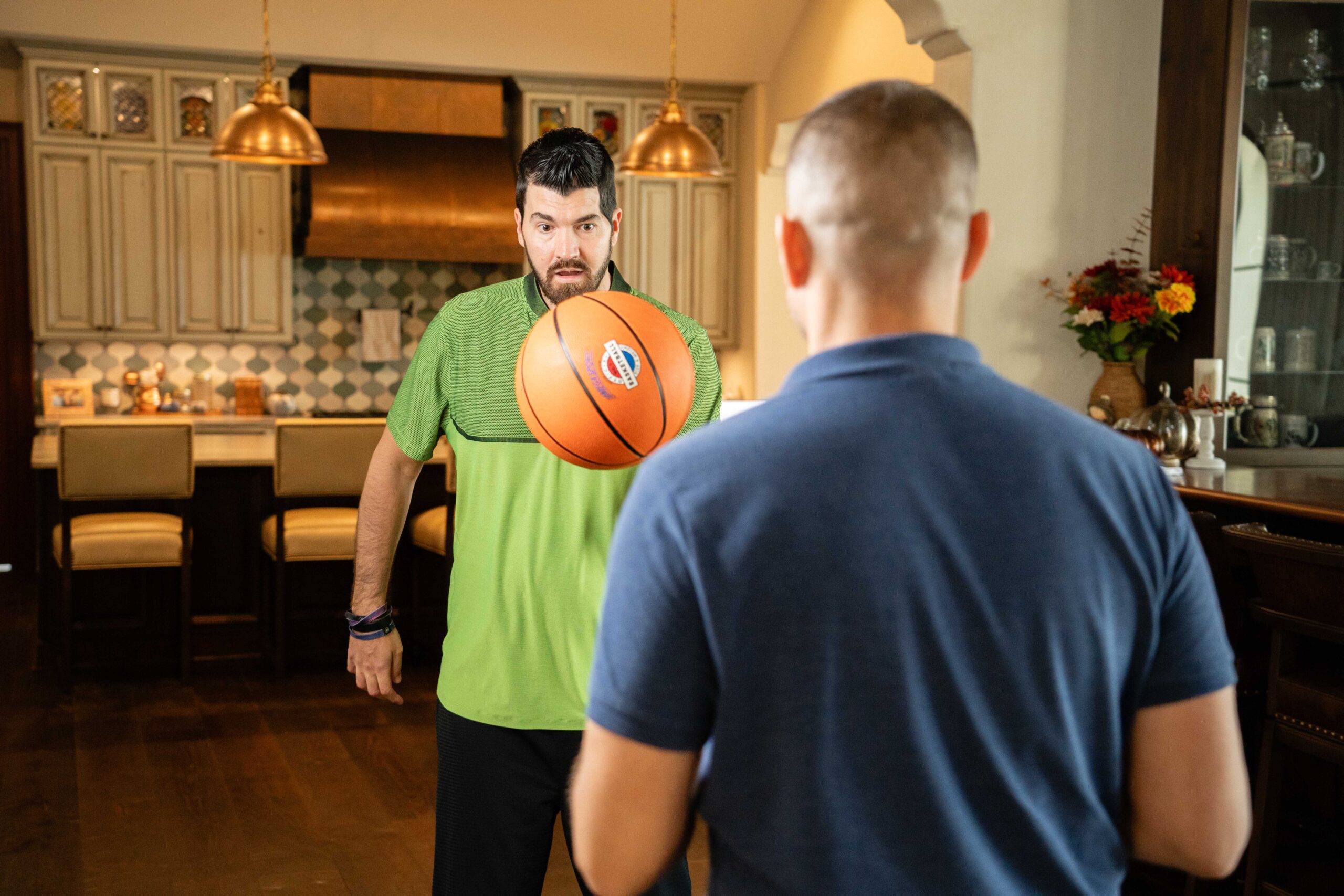
For continued brain healing, Eric receives brain mapping treatment monthly. He continues to impress all of his therapists with his ongoing neuroplasticity (re-wiring of the brain).
Launch of a Motor Speech Program at Brooks
Chris Sorensen, Eric’s father, proposed the development of an intensive program for adults with acquired apraxia of speech, so that Brooks will be able to better serve future patients and families living with Eric’s diagnosis.
Thanks to the generous support of the Sorensen family, the Eric Sorensen Motor Speech Program was created and is in phase 1 of development.
“I could never truly put into words just how amazing Eric is or just how honored I am to be a part of the Eric Sorensen Motor Speech Program,” said Hurst. “Eric has taught me so much about apraxia, neuroplasticity, and the power of a positive attitude. I am beyond proud of his continued progress, and so hopeful for the many other people who will now have direct access to the best motor speech treatment options thanks to Eric Sorensen’s legacy.”
The Eric Sorensen Motor Speech Program will ensure increased access to research-based services for patients with motor speech disorders. In addition, a new motor speech support group was formed at Brooks for adults with motor speech disorders.
Learn More
To learn more about the new motor speech support group at Brooks, visit our support group page. To learn more about the Eric Sorensen’s Motor Speech Program at Brooks, read our news update.
